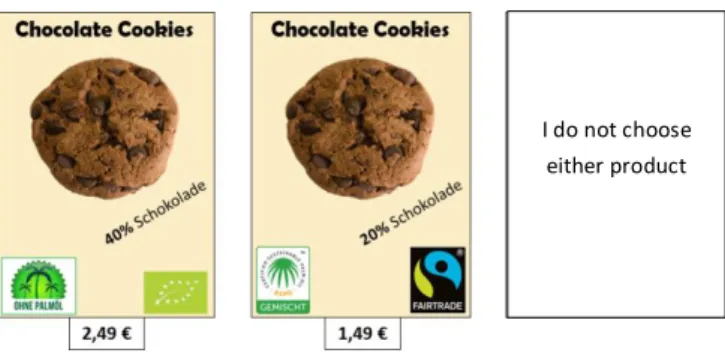Consumer preferences for sustainable, deforestation-free palm oil
Cordula Hinkes
1, Inken Christoph-Schulz
1• In Germany, products without palm oil are predominantly preferred to products with certified, sustainable palm oil.
• With the help of targeted consumer information, the demand for sustainable products containing palm oil could be strengthened.
• However, voluntary certification alone is not sufficient to achieve sustainability goals such as deforestation-free supply chains.
Background and objectives
In order to obtain land for cultivation of agricultural products (e.g. palm oil, soy), forests with high biodiversity are cleared and other vulnerable ecosystems are converted, especially in tropical regions. A large share of these "forest risk commodities" is traded internationally, and the European Union (EU) is a major importer. As a result, some state as well as private actors have committed to "deforestation-free supply chains". Despite this progress, the goal of establishing deforestation-free supply chains has not yet been achieved. So far, this measure has been largely limited to voluntary commitments and the implementation of voluntary sustainability certification. The Roundtable on Sustainable Palm Oil (RSPO), for example, has developed standards for sustainable palm oil cultivation that also include criteria for forest protection. However, a large proportion of sustainably certified products are sold in the EU without a price premium and marketed without appropriate labelling. This could be due to a lack of demand for certified products.
As part of our research on the organisation of deforestation- free supply chains, we therefore analysed how consumers in Germany feel about palm oil. The main objective was to better assess the potential demand for certified, sustainable palm oil and to derive recommendations for possible policy measures.
Research Approach
As a first step, we conducted several group discussions to capture the range of opinions and attitudes towards palm oil.
Half of these group discussions were conducted in person, the other half online in written chat format to reach people in different regions of Germany. The discussions were then analysed using the qualitative content analysis method. Based on the results, we developed concrete research hypotheses and a questionnaire.
In the second step, a nationwide online survey was conducted with 1,000 people and analysed quantitatively. Part of this online survey was a choice experiment. Here, the respondents were presented with several decision-making situations in which they had to choose between different chocolate biscuits.
The products differed, among other things, in whether they contain certified palm oil, conventional palm oil or no palm oil, which was indicated by corresponding product labels (Figure 1).
Figure 1: Example of a choice situation
Source: Thünen Institute/Cordula Hinkes (2020)
The Choice Experiment was conducted in two parts. In the first part, the participants were not given any further information apart from general instructions on how to conduct the experiment. Afterwards, information about palm oil and the different certification labels was provided before the second part of the Choice Experiment was conducted with further decision-making situations.
Results
Both the group discussions and the online survey revealed that the participants' attitudes towards palm oil are rather negative.
In particular, the deforestation of rainforests for the cultivation of palm oil, but also the feared negative health effects of palm
Thünen Institute of Market Analysis 2021/12a
I do not choose either product
Further information
Contact
1 Thünen-Institut für Marktanalyse Inken.Christoph@thuenen.de www.thuenen.de/elk
Duration of the project 10.2017-3.2021 Project-ID 1957
Publications
Hinkes C, Christoph-Schulz I (2020) No palm oil or certified sustainable palm oil? Heterogeneous consumer preferences and the role of information. Sustainability, 12(18), 7257. DOI:10.3390/su12187257 Hinkes C, Christoph-Schulz I (2019) Consumer attitudes toward palm oil:
Insights from focus group discussions.
J Food Prod Marketing , 25(9), 875-895.
DOI:10.1080/10454446.2019.1693468
Hinkes, C (2020)
Adding (bio)fuel to the fire: discourses on palm oil sustainability in the context of European policy development.
Environ Dev Sustain 22(8), 7661-7682.
DOI:10.1007/s10668-019-00541-y Hinkes, C (2020)
Key aspects to consider when conducting synchronous text-based online focus groups – a research note.
Int J Soc Res Methodol (in press).
DOI:10.1080/13645579.2020.1801277 DOI:10.3220/PB1617177891000
oil consumption have a negative influence on attitudes and preferences. On the other hand, the fact that palm oil also has advantages over alternatives, such as requiring less land, is hardly known. The standards of the RSPO and the corresponding product seals also have a very low level of awareness among the population.
Without palm oil or with certified palm oil: What is purchased?
© Cordula Hinkes
